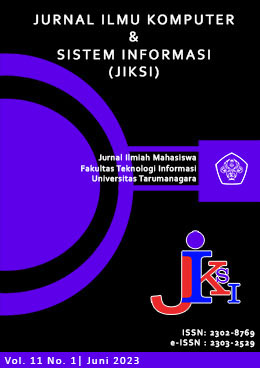PENERAPAN FUZZY TAHANI PADA REKOMENDASI OBJEK WISATA DI JAKARTA
Main Article Content
Abstract
Tourism is an important sector in building the Indonesian economy. Jakarta as the nation's capital has a variety of tourist destinations that can be an attraction for tourists to visit the city. Due to diverse destinations, tourists find it difficult to choose destinations to visit according their preferences. Therefore, a decision support system is needed in recommending tourist destinations in terms of the average 3 stars hotel price, the number of nearby restaurants, the distance from airport to tourism and destinations rating. This study aims to develop a decision support system based on Fuzzy Tahani in recommending Jakarta tourist destinations. The decision support system development method uses the stages of Rapid Application Development,, which consist of requirement analysis, design, implementation and testing. The results of this study are designing a decision support system that applies the Fuzzy Tahani algorithm method with an interface in the form of a web page that helps tourists get recommendations based on the criteria entered. For the testing there are two tests, fuzzy algorithm testing by comparing fuzzy algorithm calculations manually with calculations from the system and Black Box testing to test the suitability of the functionality of the decision support system.
Downloads
Article Details
Section

This work is licensed under a Creative Commons Attribution-NonCommercial-ShareAlike 4.0 International License.
This work is licensed under a Jurnal Komunikasi Creative Commons Attribution-ShareAlike 4.0 International License.
How to Cite
References
Soekadijo, R. G. (2002). “Anatomi Pariwisata”. Jakarta: Penerbit PT Gramedia Pustaka Utama
BPS Provinsi DKI Jakarta. (2022). “Kunjungan Wisatawan Mancanegara yang Datang ke DKI Jakarta dan Indonesia.” Diakses melalui https://jakarta.bps.go.id/indicator/16/241/1/kunjungan-wisatawan-mancanegara-yang-datang-ke-dki-jakarta-dan-indonesia.html
B. Resmi, “Perkembangan Pariwisata dan Transportasi Nasional Agustus 2021” ,No. 73/10/Th. XXIV, 1 Oktober 2021.
D. S. Maylawati, W. Darmalaksana, and M. A. Ramdhani, “Systematic Design of Expert System Using Unified Modelling Language,” IOP Conf. Ser. Mater. Sci. Eng., vol. 288, no. 1, p. 012047, 2018.
A. Pamoragung, K. Suryadi, and M. A. Ramdhani, “Enhancing the implementation of e-Government in indonesia through the high-quality of virtual community and knowledge portal,” in Proceedings of the European Conference on e-Government, ECEG, 2006, pp. 341–348.
M. A. Ramdhani, D. S. Maylawati, A. S. Amin, and H. Aulawi, “Requirements Elicitation in Software Engineering,” Int. J. Eng. Technol., vol. 7, no. 2.29, pp. 772–775, 2018.
W. Darmalaksana, M. A. Ramdhani, R. Cahyana, and A. S. Amin, “Strategic Design of Information System Implementation at University,” Int. J. Eng. Technol., vol. 7, no. 2.29, pp. 787–791, 2018.
Turban, E., Aronson, J. E., & Liang, T. P. (2005). “Decision Support Systems and Intelligent Systems” (7th ed.). Prentice Hall.
Khan, et al. (2017). “Tourist Spot Recommendation System Using Fuzzy Inference System.” 2017 14th International Conference on Fuzzy Systems and Knowledge Discovery (FSKD), 1198-1202. doi: 10.1109/FSKD.2017.8392993.
Yudono, M. A. S., et al. (2022). “Fuzzy decision support system for ABC University student admission selection.” In Proceedings of the International Conference on Economics, Management and Accounting (ICEMAC 2021) (pp. 230-237). Atlantis Press. https://doi.org/10.2991/aebmr.k.220204.024
J. Singla, “Comparative study of Mamdani-type and Sugeno-type fuzzy inference system for diagnosis of diabetes,” in Conference Proceeding - 2015 International Conference on Advances in Computer Engineering and Applications, ICACEA 2015, 2015, pp. 517–522.
Y. Hosoya and M. Umano, “Dynamic fuzzy Q-learning with facility of tuning and removing fuzzy rules,” in IEEE International Conference on Fuzzy Systems, 2012.
Hadikurniawati, W., et al. (2019). “Implementation of Tahani Fuzzy Logic Method for Selection of Optimal Tourism Site.” Journal of Physics: Conference Series, 1361(1), 012051. https://dx.doi.org/10.1088/1742-6596/1361/1/012051
Abdullah et al. (2018). “Fuzzy Model Tahani as Decision Support System for Employee Promotion.” International Journal of Engineering and Technology, 7. https://doi.org/10.14419/ijet.v7i2.5.13958
Rizaldi, et al. (2018). “Decision support system for formula milk selection based on nutrition value using Tahani model database fuzzy method.” Journal of Physics: Conference Series, 1114(1), 012092. https://doi.org/10.1088/1742-6596/1114/1/012092
Rizaldi, et al. (2021). “Decision Support System Using Fuzzy Logic Method of Tahani Model for Student Selection.” Journal of Physics: Conference Series, 1783(1), 012011. https://dx.doi.org/10.1088/1742-6596/1783/1/012011
Prabandani, E. A., & ‘Uyun, S. (2021). “Comparative analysis of fuzzy database Tahani model and Fuzzy Multi-Attribute Decision Making TOPSIS method in cotton product for determination recommendations in textile industry (Case study: PT. Pandatex).” IOP Conference Series: Materials Science and Engineering, 1077(1), 012027. https://doi.org/10.1088/1757-899X/1077/1/012027
Kendall, K. E., & Kendall, J. E. (2003). “Analisis dan Perancangan Sistem” (T. A. H. Al-Hamdany, Trans.; 5th ed.). Prenhallindo. (Original work published 2002)
L. A. Zadeh, “1965 J(Zadeh) Fuzzy Sets.pdf,” Inf. Control, vol. 8, pp. 338–353, 1965.
Kusumadewi, S., & Hari, P. (2010). “Aplikasi Logika Fuzzy Sistem Pendukung Keputusan “(2nd ed.). Yogyakarta: Graha Ilmu.

